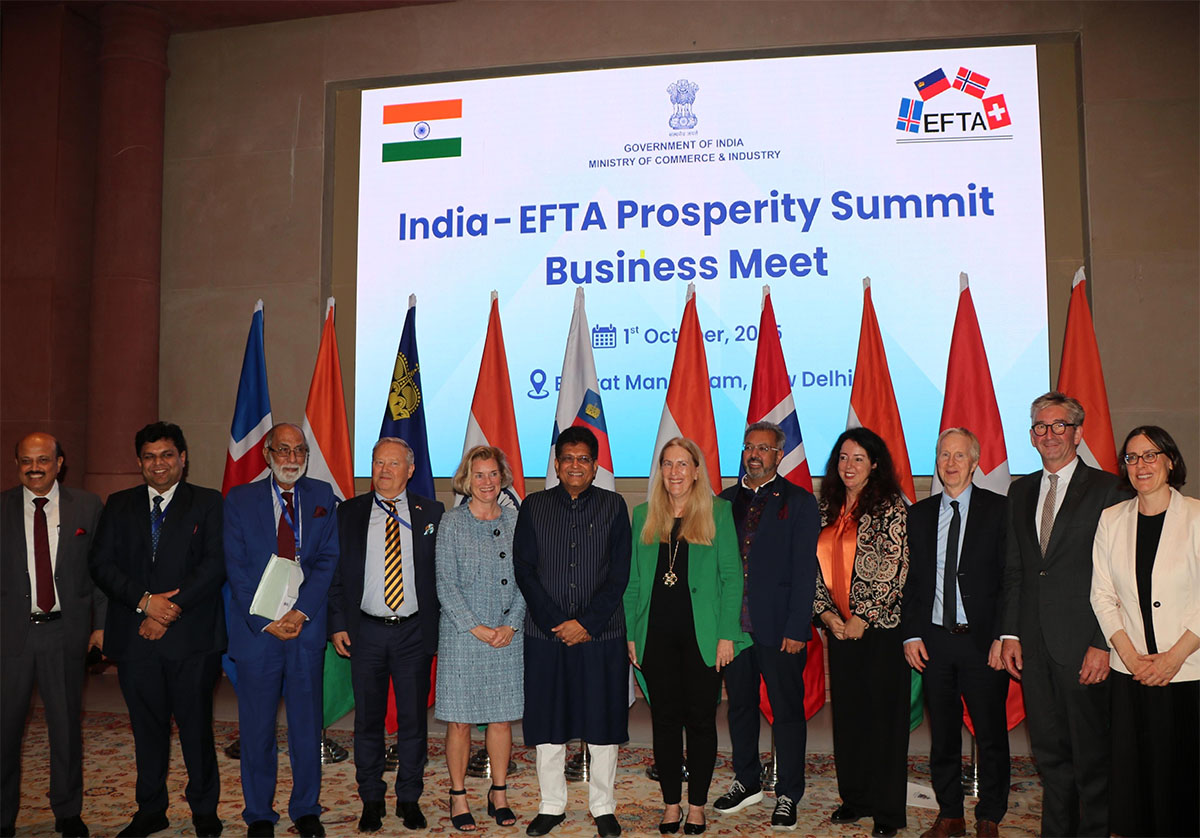
By Dr. Manuj Bhardwaj
The Trade and Economic Partnership Agreement (TEPA) between India and the European Free Trade Association (EFTA) nations – Switzerland, Norway, Iceland, and Liechtenstein officially came into effect on October 1, 2025, marking a major milestone in India’s economic diplomacy. The agreement is expected to not only enhance bilateral trade and investments but also strengthen the rule of law and bring much-needed predictability for businesses amid rising global trade complexities.
A Timely Boost amid Global Trade Challenges
The timing of the India-EFTA agreement is significant. With trade tensions between major economies and ongoing tariff revisions, particularly the U.S. Section 232 investigations on imports, global supply chains have witnessed considerable volatility. EFTA companies, which operate manufacturing and service facilities across multiple regions, have been navigating these uncertainties. In this context, TEPA serves as an instrument of economic stability, ensuring that businesses benefit from clear legal frameworks and reduced risks.
Importantly, U.S. tariffs on Indian products are not expected to affect EFTA private investment in India. Investors from Switzerland and other EFTA nations recognize the strategic importance of establishing a local presence in India – one of the world’s largest and fastest-growing markets. The agreement thus reflects a broader realization that long-term engagement with India offers far greater opportunities than short-term trade re-exports to other regions.
A Multi-Dimensional Investment Relationship
The implementation of TEPA will open diverse pathways for collaboration between India and EFTA-based enterprises. Swiss and EFTA companies are likely to engage with India through multiple channels – from direct exports to localized services and manufacturing.
Some firms will focus on exporting high-quality goods to the Indian market, while others will expand their local presence through investments in after-sales services, repair, and maintenance operations. These service-oriented engagements will generate significant local value, as they necessitate training Indian professionals and building long-term partnerships.
Several companies are expected to establish regional manufacturing hubs in India, using the country as a strategic base to serve Asian and global markets. This shift aligns with India’s “Make in India” initiative and its emphasis on positioning the nation as a global manufacturing and investment destination.
Investment Commitments and Framework Conditions
According to the agreement, of the $100 billion total investment commitment, $50 billion will flow into India within the first 10 years, followed by another $50 billion in the subsequent five years. The TEPA also includes a clawback clause, ensuring that if the committed investments do not materialize as pledged, India reserves the right to revoke certain trade concessions granted to EFTA nations.
EFTA’s market access package under TEPA covers 92.2% of its tariff lines, representing 99.6% of India’s exports to EFTA countries. The deal ensures complete liberalization for non-agricultural goods and tariff concessions on processed agricultural products. In return, India has offered concessions on 82.7% of its tariff lines, covering 95.3% of EFTA exports to India. It is notable that gold constitutes over 80% of EFTA’s exports to India, with the effective duty on gold remaining unchanged under the agreement.
Strengthening the Legal and Institutional Framework
Switzerland has expressed interest in re-establishing a bilateral investment protection treaty with India – an initiative viewed as essential to fostering investor confidence and ensuring a robust framework for bilateral cooperation. This move aligns with India’s broader policy objective of balancing investment promotion with national interests through transparent and rules-based frameworks.
Recent discussions between Indian finance authorities and EFTA representatives indicate positive progress toward developing a model investment text, reinforcing confidence that the flow of investments will be sustained under stable policy conditions.
A Step toward a Balanced Global Trade Order
The India-EFTA TEPA underscores India’s growing prominence in shaping global trade dynamics. As larger economies reconfigure their supply chains and smaller markets seek equitable participation, investment pledges such as EFTA’s $100 billion commitment demonstrate a constructive balancing of global economic interests.
For India, the agreement represents not just a trade facilitation mechanism but a strategic partnership grounded in legal certainty, mutual trust, and sustainable development. It sets the stage for long-term cooperation in innovation, technology, and industrial collaboration, aligning with India’s vision of becoming a key pillar in the restructured global economic order.
The India-EFTA TEPA exemplifies a new era of international economic cooperation driven by shared stability and mutual benefit. By combining India’s vast market potential with EFTA’s investment capacity and advanced technologies, the agreement stands as a model of modern trade diplomacy – one that strengthens the rule of law, ensures economic resilience, and reinforces India’s position as a central player in the evolving global trade landscape.
